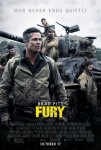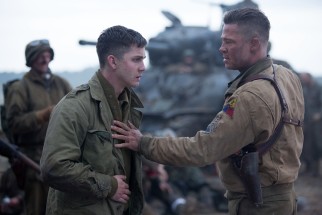Fury Movie Review
 |
Fury
Theatrical Release: October 17, 2014 / Running Time: 135 Minutes / Rating: R Writer/Director: David Ayer Cast: Brad Pitt (Sergeant Don "Wardaddy" Collier), Shia LaBeouf (Boyd "Bible" Swan), Logan Lerman (Norman "Machine" Ellison), Michael Peña (Trini "Gordo" Garcia), Jon Bernthal (Grady "Coon-Ass" Travis), Jim Parrack (Sergeant Binkowski), Brad William Henke (Sergeant Davis), Kevin Vance (Sergeant Peterson), Xavier Samuel (Lieutenant Parker), Jason Isaacs (Captain Waggoner), Anamaria Marinca (Irma), Alicia von Rittberg (Emma), Scott Eastwood (Sergeant Miles), Laurence Spellman (Sergeant Dillard), Daniel Betts (Burgermeister), Adam Ganne (SS Lieutenant) |
While George Clooney and Matt Damon were in Europe making The Monuments Men, their fellow member of the Ocean's Eleven gang Brad Pitt was gearing up We are far removed from the days when war was sanitized for mass consumption. Now, practically every new film journeying back to the middle of last century feels obligated to present that global conflict with heightened intensity, realism, and violence. Saving Private Ryan may have briefly scared filmmakers away from the subject, not wanting to be compared to Steven Spielberg's watershed epic. But World War II films continue to trickle out from all parts of the world, its impact generations later still too significant to ignore.
As the succinct title suggests, Fury is not for the faint-hearted. Ayer's film is set during the final month of World War II and centers on a five-man crew operating a tank named Fury in the heart of Nazi Germany. Apart from a few powerful wide shots, there isn't much about Fury that is epic. Little screentime is devoted to those beyond the Fury crew. They are led by Don Collier (Brad Pitt), a battle-scarred U.S. Army Sergeant whose men fully entrust him with their lives. The character viewers are most likely to identify with is Norman Ellison (Logan Lerman), a wide-eyed young man from Pittsburgh who had been working as a typist before being assigned to operate one of Fury's machine guns.
It is trial by fire for the new soldier who can't bring himself to fire at the enemy. His innocence subjects him to some hazing from Fury's slightly older, far more desensitized fellow gunmen: the devoutly religious "Bible" (Shia LaBeouf), the brutish mechanic Grady (Jon Bernthal), and Gordo (Michael Peña), the gunner now at Norman's side and the closest thing the film has to a comic relief.
Fury is compelled to remind us of the brutality of war again and again. The opening scene finds an SS soldier on horseback take a knife to the eye and other parts of the body. Probably the most unforgettable of the graphic images is a piece of a man's face that Norman encounters while cleaning inside the tank as his first task. Norman loses his innocence before our very eyes, pushed into successive rites of passage (his first kill and his presumably first sexual encounter) by Sergeant Don, who is not one to mince words.
The film spends a lot of time in one small town the Allied Forces have cleared out as Norman and Don enjoy the company of a pair of female cousins roughly the same ages as them. When the others join them, the mood sours, as one meal is uncomfortably shared. This may be the film's most remarkable (and longest) scene until its finale arrives and the men of Fury find themselves against incredibly long odds, Fury is well-made technically, which probably shouldn't surprise those who have watched Ayer mature from successful action movie scribe (The Fast and the Furious, Training Day) to respected auteur (End of Watch). The film avoids artifice and flinching of any kind. That is in stark contrast to Monuments Men, but many others have also opted for such lip-biting authenticity in depicting the horrors of war and they have done so with a more compelling story and characters. While the cast is uniformly good, it is Lerman (best known from The Perks of Being a Wallflower and the two Percy Jackson movies) and Pitt (who picks up another executive producer credit) who most catch our eyes with their conflicting styles of crisis management.
In a world where Saving Private Ryan hadn't been made and Pitt hadn't just memorably conquered Hitler and the Nazis five years ago, Fury might resonate deeply. Instead, it will simply stand as a dramatically potent reminder that the oft-remembered heroism of World War II involved some real atrocities many have tried hard to forget.
|
Related Reviews:
DVDizzy.com | DVD and Blu-ray Reviews | New and Upcoming DVD & Blu-ray Schedule | Upcoming Cover Art | Search This Site
Brad Pitt: The Curious Case of Benjamin Button Moneyball World War Z | Logan Lerman: Noah Percy Jackson: Sea of Monsters
Jon Bernthal: The Wolf of Wall Street The Walking Dead: Season 1 Grudge Match | Michael Pena: American Hustle Gangster Squad
World War II: The Monuments Men War Horse The Thin Red Line From Here to Eternity The Best Years of Our Lives The Railway Man
War: Platoon Apocalypse Now Full Metal Jacket Paths of Glory Lawrence of Arabia
Now in Theaters: St. Vincent Gone Girl The Judge The Drop Boyhood


